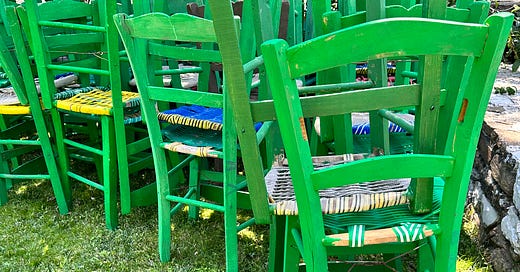This past summer, during the nearly five weeks in which I was in Greece, people kept telling me not to worry. Specifically, they kept saying “μην αγχωνεσαι”, a Greek phrase whose linguistic make-up gives it a more complicated meaning than just “don’t worry”. To tell someone μην αγχωνεσαι is to tell that person not to anxietize themselves, not to give themselves anxiety. (The English word “anxiety” comes from the Greek αγχος or, in transliteration, anchos.)
People kept telling me not to give myself anxiety. Interestingly enough, they kept saying this in reaction to my thoroughly calm statements or questions. For instance, in the run-up to the big celebration of my son’s wedding, my question to the caterer asking when we should give him the number of beers my son and his wife wanted to order was met with “μην αγχωνεσαι”. An offer that we family members do the setting up of the tables and chairs was met with “μην αγχωνεσαι”. Nobody ever wanted me to worry, which was lovely. And in truth I never was anxious—though I began to wonder if I should be !1
As someone who thinks and speaks Greek and English equally and sometimes at the same time, I often puzzle over the seeming choices embedded within the linguistics of a certain phrase in either language. So I keep thinking about this Greek formulation. In situations where someone else is talking about your emotional state, the Greek language turns anxiety into something you do to yourself. Whereas, if you’re talking about your own emotional state, you can say you have anxiety: εχω αγχος.
It’s possible for a Greek speaker to say μην σε πιανει αγχος—which means don’t let anxiety take hold of you. But it’s more common these days for people to use the reflexive verb. And so, there’s a weirdly demeaning attitude built in here, in which one person perceives another’s anxiety as something they do to themselves, while they perceive their own anxiety as something they’re in control of, in possession of.
There’s this idea (implicit in the phrasing) that the person being addressed is going out and seeking anxiety where none is necessary. And this has me wondering about anxiety in general (anxiety has a way of doing that, doesn’t it) and about the merits and disadvantages of seeking anxiety out.
Surely there is never an advantage to seeking out anxiety, right? But permit me a bit of a linguistic stretch here as I consider the root of the word in Greek and its possible original meaning of stress and strain. It seems logical for one person to tell another “don’t take on such and such a strain”. At least it’s logical in a world in which someone sees fit to just tell you not to worry or not to feel sad—as if all you needed was to be reminded. Oh, right! I forgot I didn’t need to be sad. Thank you for reminding me. I’ll stop now!
Let’s set aside for the moment the well-meaning (?) attitude of simply telling people not to worry, and let’s think about whether there are times when it’s appropriate to worry or to stress or to strain at something. I can’t help but think of this in the context of the other thing that was going on for me during some of my time in Greece: my third 44km trail race, and, generally, trail running or hiking and, well, putting the body under some strain.
Many of my Greek family members would have one word on that: don’t. Just don’t. Don’t breathe hard, don’t get tired, don’t get sweaty, don’t. They have often said exactly this to me when they learn of some sports plan I have. I understand their attitude, especially if you’re a person who has (or whose forebears have) earned the ability, after war or economic challenges, to not suffer physically. Or even more especially if you’re a person who has anxieties and stresses you cannot avoid. Why would you sign up for suffering if you didn’t have to? Μην αγχωνεσαι, already!2
But sometimes we have to choose to be anxious. We have to choose to come under stress and strain. There are few endeavors in life in which it’s possible to improve without experiencing some level of strain. Isn’t it better to find ways to choose anxiety before it chooses us? To opt in in some way that can get us to a goal we have, rather than wait to be slammed or clouded by an awful feeling?
I write this as the year comes to a sort of cusp, with the weather changing and the school year starting, and even those of us who haven’t had anything to do with a school in years feel the beginning of a new year. Cusps are hard. The liminal time of the fall has often been tough for me—both exciting in its promise of new beginnings (especially for yours truly who loved school), and ominous with its portent of some sort of stock-taking. It’s anxiety-making. Autumn is almost my favorite time of year, with the coming chill and the sense of renewal. But I feel I pay for that pleasure with the unease and, well, anxiety that precedes and sometimes shrouds it.
The solution, for me, isn’t to just not be anxious—as if the anxiety were a suitcase I kept holding while standing in a long line and forgetting I could set it down between moves (you know what I’m talking about, right?). The solution is probably to make myself anxious in a very deliberate way, by owning it and choosing it. Linguistically, it’s like moving from the reflexive to the possessive mode with our anxiety.

Keats had a wonderful way of thinking about unease—and making it an important element of creativity. In an 1817 letter to his brothers, he recounts a conversation with Charles Dilke in which it has occurred to him “what quality went to form a Man of Achievement, especially in Literature”. He goes on:
“I mean Negative Capability, that is, when a man is capable of being in uncertainties, mysteries, doubts, without any irritable reaching after fact and reason.”3
Keats’ “[person] of Achievement” in literature is someone who can tolerate a certain level of anxiety, who can embrace the very cusp-y feeling of autumn and the uncertainties of a liminal state. Perhaps in order to really be creative, we need to allow some of the very anxiety everybody in Greece wanted so desperately for me not to have.
In Greek, the reflexive imperative of the verb sounds ridiculous—αγχοςου!—because no one would ever use it. Still, that’s what I need to hear right now, coming from someone well-meaning, maybe even from myself. Be a certain kind of anxious—where anxiety is the thing you can take charge of and use to help get you through the weird liminal awkward time we’re in. Be a certain kind of anxious—if it allows you to linger in the generative space of mysteries and doubts.
I must say that the whole event came off beautifully and with not a moment of worry at all!
There’s another element here which is kind of troubling. Those who tell you not to worry yourself are often the very same people who will take on your worry for you. They’re saying they’ll take up the burden but that you must not. This is a kindness, sure. But there are ways in which these statements get embedded in class and larger societal elements and an examination of that is likely better served in another forum.
http://mason.gmu.edu/~rnanian/Keats-NegativeCapability.html






Mazel Tov (or whatever the Greek phrasing is) on your son's wedding! I really enjoyed your first audio Substack - great job!
In my experience, the people telling me not to worry are often the cause of the worry!